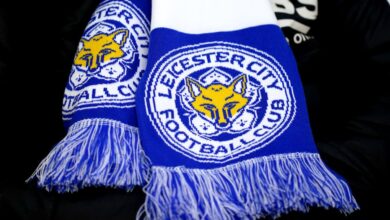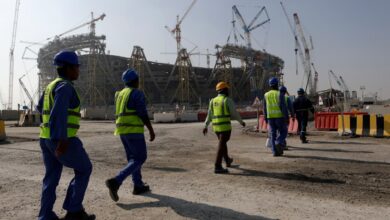Qatar’s World Cup legacy has to go beyond a spectacular vanity project – but will it?

As the former Fifa president Sepp Blatter announced that Qatar would host the 2022 World Cup, the responses within the Zurich auditorium on that snowy Thursday in December 2010 revealed much more. They also hinted at what was to come.
The Qatari royal family jumped in jubilation, some in “disbelief” that it actually happened. Their cheers echoed around the auditorium, though, because almost everyone else was stunned. A few of football’s most powerful figures were enraged.
In the middle of it all, one man was relieved but not surprised. Mohammed bin Hammam, the driver of Qatar’s bid, had been ticking off the votes throughout. As early as the first round, Qatar had received 11, requiring just one more to seal victory.
It was as much a formality as a shock.
This was because, to use the leaked description of former Fifa secretary general Jerome Valcke, Qatar had “bought the World Cup”. Mr Valcke later claimed he was speaking metaphorically. It is estimated the state spent close to €200m (£169m) on the bid, almost five times more than the next most costly campaign. That was Australia, who received just one vote.
As a consequence of that victory, and a complete change to hosting plans that Fifa’s own report described as “high risk”, Qatar has committed to spending £5.2bn on new stadiums and £150bn on infrastructure around the World Cup.
That project has required a construction plan that has made this tournament perhaps the most controversial sporting event in history, certainly since the 1980 Moscow Olympics, due to a system that inherently involves the abuse of migrant workers. Qatar disputes the figure of 6,500 deaths that The Guardian has put forward, but the only reason they can argue that is because the state has so far refused to investigate the true numbers.
It has all involved so much money, so much controversy, so much human suffering… and for what?
The question of why Qatar wanted to host the World Cup is more relevant now than ever, particularly given the deeper discussion over whether the motivations are the same. The world, 100 days out from the start of the tournament, is a very different place to what it was on 2 December 2010.
Qatar itself was “probably the Gulf state about which the least was known” on that afternoon, according to the human rights organisation FairSquare’s Nick McGeehan. That has drastically changed. In the moment of victory, the Qatari delegation gave all the official platitude about hosting the World Cup.
“Thank you for believing in change,” Sheikh Mohammed said breathlessly. “Thank you for believing in expanding the game. Thank you for giving Qatar a chance, and we will not let you down. You will be proud of us, you will be proud of the Middle East and I will promise you this!”
Much was made at the time of how the event would bring “billions of people to the Arab world”, while also bringing the Arab world together. Qatar initially hoped to attract support from the entire region, as a “unity bid”.
There is quite a tragic irony to that, given what has actually happened. It should be acknowledged that there is genuine merit to the idea of hosting the World Cup in the region for the first time, and there could have been something special about it.
Instead, many make the argument that it was a significant factor in the Gulf blockade which lasted for three and a half years from 2017 – where Saudi Arabia, the UAE, Bahrain and Egypt cut ties with Qatar accusing it of supporting terrorism among other claims – such was the resentment within Saudi Arabia and the United Arab Emirates about Qatar’s rising profile. On the other side, though, the World Cup probably played its part in helping Qatar to come out of the blockade stronger.
The apparent contradiction to that reflects the more complicated elements to this, far beyond the state’s genuine love of football and the desire to spread the game.
The Qatar World Cup is set to be a controversial one given the alleged human rights abuses
Qatar had been seriously investigating the purchase of Manchester United before the bid, but couldn’t make progress with Old Trafford club’s Glazer family owners. There were also more tentative discussions around Liverpool, Tottenham Hotspur and Arsenal, who the “Father Emir” is said to support.
It is no coincidence all of this came in the period after Gulf rivals Abu Dhabi bought Manchester City in 2008, a takeover that also represented a touchstone moment in pushing football into a new geopolitical age.
Qatar, in the words of many involved, wanted their own prize. They ended up initially going for much more traditional “sportswashing”. That was the hosting of a great event.
All of this was part of a more sophisticated and longer-term plan to diversify their gas-based economy, reposition the state in the eyes of the world and – as much as anything – increase security.
There were many motivations behind the bid





